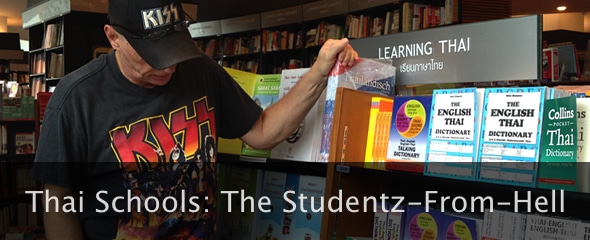
Thai Schools on the Studentz-From-Hell…
Awhile back I went to seven previously reviewed Thai schools. I asked the owners of the schools, the teachers, as well as the front desk staff, if they’d be interested in participating in an informal survey. I explained that I wanted to find out what they thought were the best and worst foreign learners of the Thai language.
Now, before you poo-poo this survey as just another hare-brained idea from Tod Daniels, or try and say my study sample is too limited, please let me explain. In just one of the schools, eight teachers contributing to the survey have taught Thai to non-native adult speakers a combined 128 years! That averages out to about 16 years experience apiece. And that was just at ONE of the schools I queried. The other schools are equally impressive, so if anyone is to be believed, it’s the Thais in the trenches.
Anyway, I set up meetings after school hours because there was no time to hash out this stuff during the short 10 minute breaks between classes. At the meetings I asked what they thought were the best learners of Thai versus what they thought were the worst learners of Thai. Surprisingly, every teacher was more than happy to offer their opinion. And often in a animated, humorous way, with anecdotes and stories of the Studentz-From-Hell. As you can imagine, a good time was had by all. Taking copious notes, I phrased questions in different ways to weed out spurious answers.
Some of the time I spoke in Thai, and some of the time in English. The mountain of information I gleaned was insightful (to me at least).
After I finished with the school owners and Thai teachers I then asked the front desk staff to start obliquely quizzing new students about what education level the students possessed, what other languages they spoke, and how old they were. Now, some of the schools were already doing this so it was just a matter of handing me a pile ‘o paperwork and letting me paw thru and take notes. But some of the schools never did this before, and now many do. So when you enrol in a Thai language school and they bug you for this stuff you can either thank or hate me for getting them to pry into your personal business.
After compiling the data I’d gleaned from the teachers I waited a couple months, then went back and met with the front desk staff to see what other information they’d accrued. I also revisited the teachers to see if they had more to add. We then reviewed my findings.
Thankfully, the fact that I was going to other Thai language schools as well didn’t come up even once. You see, I wanted as much cooperation as I could at each of these schools and I found out early on that the school’s owners didn’t like each other one little bit! Even though some are in the same building, have swapped out teachers on occasion, and the owners know each other, they can be awfully prissy when it comes to mentioning other schools.
Once I had the data I put it in a semblance of order. At first everything just seemed random, almost nonsensical. But after sorting it in different ways several issues appeared over and over. What threw me at first was that the information I gleaned from the various schools was presented in different manners. Once I realised this fact, I started making real progress.
Although I’m just gonna present what I found, you’ll be glad to know the results are based on the empirical data and the feedback I gleaned from the schools. Plus, I came up with a viable criteria to sort through it all.
Trust me. I didn’t make any of this up. And you can totally disagree with my findings, and that’s ok by me.
I gathered the below data on foreigners learning Thai, because plain and simple, I’m nosy about other students. Incredible as it may seem (what with my off-the-wall personality) I have a fairly good relationship with the Thai language schools scattered around Bangkok, that made compiling data not troublesome at all!
If you recognise yourself in this post, hopefully you’ll find my tipz-n-trickz a help in skewing the odds in your favour to learn Thai.
What are “STUDENTZ-FROM-HELL”?…
Studentz-from-hell: Plain and simple, students from hell are just that. Hell. They are students who refuse to accept they’re in class to learn. They are somehow unaware that they are in a roomful of other students, with what should be a competent teacher of Thai. These annoying students do whatever they can to make the class time drag out. Other students and the teacher end up miserable as well.
Classroom Commandeer-erz: These are students who monopolise and/or commandeer a class (much to the chagrin of the other students). For every one question asked by other students, they ask five inane and often unrelated questions. They constantly interrupt, interject, and unconsciously or not, become such a detriment to the other students that they are even ostracised during breaks! They make the teacher spend an inordinate amount of time on them and their issues rather than realising the other students deserve an equal share in the teacher’s time as well. This particular student would be better suited to private lessons, and in that way, they could bother a teacher to their heart’s content.
Non-participantz: The exact opposite of the Commandeer-erz, these students do not participate in class either with teachers or students. They often act miserable. I dunno, maybe they are miserable. What I do know is that a negative attitude, especially in something that has the potential of being difficult, is a losing proposition.
Why-erz: No, I’m not talking about mindless foreigners who wander around Thailand wai’ing every limbless beggar, 7/11 worker and Soi Dog! I’m talking about students who insist on asking “why” at every opportunity. In Breaking Down the Wall of Whyz (shameless plug) I pointed out that knowing the why behind the way things are in Thai doesn’t help you become more proficient in the language itself. It does give you tidbits of the background on the language, but unless you’re ever going to be on Jeopardy and the Thai language comes up, the knowledge doesn’t really help you progress.
Laterz & Skipperz: Laterz are people who waltz into class 10-15 minutes after it starts like it’s not a problem. They don’t know what lessons are being taught, and they disrupt the entire flow of the class when trying find the right page, etc. The Skipperz believe they can miss a couple days of class and still keep up. Now, I know once in a while we all have business to attend to and need miss a class or two. That doesn’t mean we can’t study what was covered so we can semi-participate in the next class. Both of these types of students are a detriment to other students who do manage to show up on time, and are doing their best to learn. Some schools have now implemented a policy of locking classroom doors 10 minutes after each class starts, forcing the Laterz to wait until the next hour to rejoin the class.
Teaching Expertz: Not surprisingly these are foreigners who think they are experts in how Thai should be taught in class. It’s true we all develop our own little tricks and tips which make Thai click for us. And there’s nothing wrong with sharing this information with the other students at an appropriate time, like on a break. However, if you were indeed an expert, you’d already speak Thai. Right?
Know-it-allz: This particular demographic of student just flummoxes me. They clearly have taken the level at least once, sometimes several times. They know the material inside, outside, upside down, in a box, with a fox, but they won’t advance themselves to the next level. I think they enjoy making us squirm in our seats as we stumble thru sentences mangling new words. Don’t confuse the Know-it-allz with people who take a level, but want to really make it stick so take it again. They know that each level builds on the previous and bluffing your way thru just ain’t gonna cut it.
Kibitz-erz: These are students who, no matter their nationality, clump together and whisper to each other in their own language during class. This is especially troublesome in lessons at schools which have ‘Thai ONLY’ rules. It is distracting to others trying to learn Thai.
Over Their Head-erz: As you might surmise these students bluffed or blustered their way into a level of Thai which is way beyond their current ability. They drag down a class pretty fast because they don’t have the foundation of material which was supposed to be learned in previous level(s). To accommodate, teachers try to draw a happy medium by teaching to neither the slowest nor the fastest learners, so this type can easily kill the flow of a class.
Technoz: These are students who are glued, and I mean glued, to their mobile devices. They check their dictionary apps for every permutation of a Thai word and get totally lost in their searches. It results in being unable to keep up with what’s going on in class. I’m all for using tech. And there’s certainly no shortage of really good Thai dictionary apps out there. I just suggest that people use their class time wisely by getting the most out of it at the time. There’s plenty of time during break and after class to look deeper into a subject.
Interrupterz: These are not people who interrupt in class with questions. These are students who just will NOT turn off or mute their mobile devices! They’re constantly getting and responding to SMS’s, Facebook updates, and conversing with people on Line. They drive me up a wall. They also take phone calls in the classroom, walking out to chat and then wandering back in again. Now, I know that some of you are in business here, and that’s great, but you have no business learning Thai in a group setting if you can’t go 50 whole minutes without communicating with the outside world. I was sitting a class just the other day and a student got a phone call. He answered it, talked IN the classroom for two or three minutes like it was nothing. That is just plain poor form and I think at the very least the teacher should have called him on it.
Rusherz & Blurerz: These are students who have an adequate command of the vocabulary being covered in a particular module or lesson plan but for some reason spit out what they want to say so fast, so incoherently, that even the teacher has no idea what they just said. I had this particular affliction when just starting to speak Thai. It was almost as if I needed to get out what I wanted to say as fast as I could. I didn’t care if it was right or wrong, I just felt the overpowering need to spit it out. It ended up coming out like a blur of jumbled up syllables. Tip: take a deep breath, slow down and try to enunciate what you’re saying. This will let the teacher hear enough of what you are trying to say to correct you (and that’s a good thing).
Mice or Whisper-erz: These are students you can barely hear. They seem to purposely lower the volume when they’re speaking Thai. It’s frustrating to the other students and to the teacher as well. I know we’re all hesitant about having other people hear us speak Thai, especially when we are at the “I speak sucky Thai” stage. But that’s part of the learning curve. There is no wrong when learning conversational Thai. It isn’t a test. Do the best you can to practice what you’re learning, and speak up so the teacher can correct you.
Bouncerz: These students bounce from one school to another, trying method after method, book after book, and program after program, yet still can’t get Thai to click. I’ve met a LOT of this kind of students and to a person they’re primarily westerners NOT Asians. It’s almost as if the westerners are trying to find the school or the method which works for them instead of realising they have to adapt their learning to the available methods. These students often possess an eclectic vocabulary in Thai, but fall short on good Thai sentence structure.
Are you a “STUDENT-FROM-HELL”?…
Realising disruptive in-class behaviour is valuable for those trying to make their way thru the minefield that is the Thai Language. So, what can you do if you have a particular personality trait that lumps you into one or more categories? Do take note of it. Admitting you have a problem is the first step in solving it. The second step is actually doing something about it.
Anyone who’s studied Thai in a group setting has met at least one, perhaps more of the studentz-from-hell that I’ve outlined above. Please feel free to share your experiences in the comments section below – I’d love to hear all about it!
Next I’ll cover the school data in-depth, breaking it down by category.
Good Luck,
Tod Daniels | toddaniels at gmail dot com







At first I thought you were talking about Thai students in a class with a farang English teacher.
Many of the things you mentioned are more of a reason to believe you are in a classroom with a teacher from hell who refuses to take control of the class and make sure it is conducted in a proper manner.
Excessive questioning, non participation, Why-erz, etc, etc…
Virtually every category shows a failed teacher, not necessarily a student from hell, although they are being allowed to be a student from hell.
It has driven me nuts for years that teachers allow the Korean and Chinese Kibitz-erz to incessantly interrupt our classes! I didn’t find it a problem much at all with farang or Japanese. When I’ve asked them to either stop or if they find it absolutely necessary, to please whisper, they just get indignant.
I beg to differ on your take of Teaching Expertz. One may be well versed in teaching languages to non native speakers, but not understand the Thai language to know when things are being done poorly. It doesn’t take a genius to realize when a curriculum and/or teaching ability sucks. Of course that doesn’t mean that one should parade that around and demean the teacher or the school. But there are constructive ways of helping. Unfortunately, Thais, in my experience, have a tendency to be extremely difficult to help because they consider themselves to be the experts or the ones at the top of the totem pole and thus unassailable and anyone who has any kind of criticism of them or their school whatsoever, whether positive, respectful and constructive or not, are just like uncouth, uncultured beasts who don’t respect Thailand. I have met exceptions, but far too much of the other.
Not sure what the problem with Rusherz & Blurerz and Bouncerz is…? They are trying to learn and are imperfect. A teacher is there exactly for the purpose of helping a Rusher & Blurer. A teacher who thinks they are a student from hell, doesn’t understand their job!
Bouncerz? Every student has their own particular way of learning that works best for them. A teacher who is in control of their teaching environment and their curriculum will appreciate these kinds of students and will know how to help them, at least to some degree.
It seems more that the problem is with the teachers from what I read in your article. A lack of professionalism in teaching is a major problem in my experience. Demanding respect and whining about these kinds of students while doing NOTHING about it shows the exact reason why they don’t gain the respect they believe they should have. Unfortunately the lack of respect overflows to a disrespect of the other students’ attempt to have a decent learning environment as well. I totally believe the blame lies squarely at the feet of the teacher and not with these students from hell. They are only students from hell because the teacher bred them, or allowed them, to be so.
The most obvious problem with farang is the difference in culture resulting in needless discussion about unimportant things and the loss of time as a result of that. In the end
I just think that Japanese for instance are more willing to work and complain less. There of course some exceptions and i’ve met motivated farang too.
Interesting point Kris; This is something I’ve time and again at almost every thai language school I’ve toured.
The early beginner, intermediate conversational classes are nearly full of students from every where. However, as the difficulty goes up with higher levels of conversational thai, reading and writing, the number of “foreigners” (who aren’t asian) goes down, dramatically!!!
Sometimes as you pointed out, there’re only asianz in the advanced classes.
I don’t know why this is.. Perhaps non-asian foreigners have a different objective in learning thai and stop after basic conversational thai courses.
I wouldn’t shoe-horn just non-asian foreigners as problematic students. True, they tend to ask more questions, but I’ve seen some pretty motivated non-asianz in classes AND I’ve seen some asianz fit the bill perfectly as far as studentz-from-hell in classes too!
Thanx for reading…
I think if you stay long in the same school and you move up to a higher level the number of problematic students goes down. There are very few farang anyway in the higher levels and those with the worst attitude are usually farang. In the higher levels you’ll find in most schools only Koreans and Japanese.
I’ve never been in a Thai classroom with other students but over time I’m sure I’ve managed to tick off most of those categories all on my lonesome.
Observant. With all these categories, how many agreeable diligent students is a teacher left with?
I volunteer at a temple’s high school [not in BKK] and recognize a few of your categories. But my students somehow are not obnoxious, just being Thai and oblivious to a Western way of doing things.